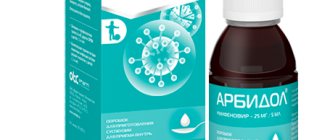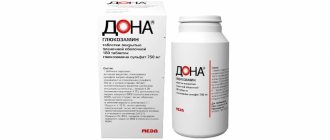Contraindications
- hypersensitivity to aceclofenac, other non-steroidal anti-inflammatory drugs (NSAIDs) or to any auxiliary component of the drug;
- asthma attacks, acute rhinitis, angioedema or urticaria caused by taking acetylsalicylic acid or other NSAIDs;
- history of gastrointestinal bleeding or ulcer perforation associated with previous NSAID therapy;
- ulcer or bleeding, including a history (two or more separate proven episodes of ulcer or bleeding);
- acute bleeding or diseases accompanied by bleeding (hemophilia or bleeding disorders);
- congestive heart failure (NYHA functional class II-IV) coronary heart disease, including angina pectoris or previous myocardial infarction, peripheral arterial disease;
- cerobrovascular disorders or diseases; history of stroke or episodes of transient ischemic attacks;
- coronary artery bypass grafting (to relieve pre-operative pain) or use of a heart-lung machine);
- severe liver failure;
- severe renal failure.
Buy Airtal powder for the preparation of an oral suspension 100 mg pack. 3g No. 20 in pharmacies
Aertal Buy Aertal in pharmacies
DOSAGE FORMS powder d/prig suspension 100 mg
MANUFACTURERS Almirall Prodespharma S.A. (Spain) Gedeon Richter JSC (Hungary)
GROUP Anti-inflammatory drugs - phenylacetic acid derivatives
COMPOSITION Active substance - aceclofenac.
INTERNATIONAL NON-PROPENTED NAME Aceclofenac DESCRIPTION Pharmacological action: NSAID, a derivative of phenylacetic acid. It has anti-inflammatory, analgesic and antipyretic effects associated with the suppression of COX 1 and 2, which regulate the synthesis of prostaglandins.
Pharmacokinetics : After oral administration, aceclofenac has a high degree of absorption. Cmax is reached within 1.25-3 hours. Penetrates into the synovial fluid, where its concentration reaches 57% of the concentration level in plasma and the time to reach Cmax is 2-4 hours later than in plasma. Vd - 25 l. Binding to plasma proteins (albumin) - 99%. Aceclofenac circulates mainly unchanged, its main metabolite being 4′-hydroxyaceclofenac. T1/2 is 4 hours. It is excreted by the kidneys, mainly in the form of hydroxy derivatives (about 2/3 of the administered dose).
Indications for use of the drug AERTAL®: Inflammatory diseases of the musculoskeletal system, incl. rheumatoid arthritis, psoriatic and juvenile arthritis, ankylosing spondylitis; gouty arthritis, osteoarthritis.
Dosage regimen: Adults are prescribed 100 mg orally 2 times a day. in the morning and in the evening.
Side effects: From the digestive system: gastralgia, nausea, vomiting, dyspepsia, flatulence, anorexia, increased activity of liver transaminases, gastrointestinal bleeding, erosive and ulcerative lesions and perforation of the gastrointestinal tract, hematemesis, melena, fulminant hepatitis, constipation. From the central nervous system and peripheral nervous system: headache, dizziness, agitation, perceptual disturbances, paresthesia, memory loss, disorientation, visual, hearing and taste disturbances, tinnitus, sleep disturbances (drowsiness or insomnia), irritability, convulsions, depression , anxiety, tremor, aseptic meningitis. Allergic reactions: skin rash; rarely - urticaria, eczema, erythema multiforme, erythroderma, systemic anaphylactoid reactions, bronchial asthma, in some cases - vasculitis, pneumonitis, malignant exudative erythema (Stevens-Johnson syndrome), toxic epidermal necrolysis (Lyell's syndrome). From the urinary system: rarely - peripheral edema; in some cases - acute renal failure, hematuria, proteinuria, interstitial nephritis, nephrotic syndrome. From the hematopoietic system: thrombocytopenia, leukopenia, agranulocytosis, hemolytic anemia, aplastic anemia. From the cardiovascular system: tachycardia, increased blood pressure, chronic heart failure.
Contraindications to the use of the drug AERTAL®: Erosive and ulcerative lesions of the gastrointestinal tract (in the acute phase), gastrointestinal bleeding or suspicion of it, “aspirin triad” (a combination of bronchial asthma, recurrent polyposis of the nose and paranasal sinuses and intolerance to acetylsalicylic acid and pyrazolone-type drugs ), impaired hematopoiesis of unknown etiology, blood coagulation disorders, severe liver failure or active liver disease, severe renal failure, progressive kidney disease, hyperkalemia, the period after coronary artery bypass surgery, pregnancy, childhood and adolescence under 18 years of age, increased sensitivity to aceclofenac.
Use of the drug AERTAL® during pregnancy and breastfeeding: Aceclofenac is contraindicated for use in the third trimester of pregnancy. In the first and second trimesters of pregnancy and during lactation, aceclofenac is prescribed with caution, only in cases where the expected therapeutic effect for the mother exceeds the potential risk for the fetus or infant.
Use for liver dysfunction: Contraindicated in active liver disease. Use with caution if you have a history of liver disease. In patients with liver failure (chronic hepatitis, compensated cirrhosis of the liver), the kinetics and metabolism do not differ from similar processes in patients with normal liver function. When carrying out long-term therapy, it is necessary to monitor liver function, peripheral blood patterns, and stool analysis for occult blood.
Use for impaired renal function: Contraindicated in cases of severe renal failure or progressive kidney disease. Use with caution if you have a history of kidney disease. Due to the important role of prostaglandins in maintaining renal blood flow, particular caution should be exercised when administered to patients with moderate renal impairment.
Use in elderly patients: Particular caution should be exercised when prescribing to elderly patients.
Use in children: Contraindicated: children and adolescents under 18 years of age.
Special instructions: Use with caution if there is a history of liver, kidney or gastrointestinal diseases, bronchial asthma, arterial hypertension, coronary artery disease, indications in the anamnesis of the development of ulcerative lesions of the gastrointestinal tract, in the presence of Helicobacter pylori infection, cerebrovascular diseases, dyslipidemia/hyperlipidemia, diabetes mellitus, diseases of peripheral arteries, in smokers, in elderly patients, with long-term use of NSAIDs, with frequent alcohol consumption, with severe somatic diseases. Prostaglandins play an important role in maintaining renal blood flow, so special caution should be exercised when prescribing to patients with heart or renal failure, the elderly, those taking diuretics, and patients who, for any reason, have a decrease in blood volume (for example, after major surgery). . If aceclofenac is prescribed in such cases, it is recommended to monitor renal function as a precaution. In patients with liver failure (chronic hepatitis, compensated cirrhosis of the liver), the kinetics and metabolism do not differ from similar processes in patients with normal liver function. When carrying out long-term therapy, it is necessary to monitor liver function, peripheral blood patterns, and stool analysis for occult blood. Impact on the ability to drive vehicles and operate machinery During the treatment period, it is necessary to refrain from engaging in potentially hazardous activities that require increased concentration and speed of psychomotor reactions.
Drug interactions: With simultaneous use, aceclofenac increases the plasma concentrations of digoxin, lithium and phenytoin. With the simultaneous use of potassium-sparing diuretics, the risk of hyperkalemia increases, and with anticoagulants - the risk of bleeding (regular monitoring of blood clotting is required). Aceclofenac reduces the effects of diuretics and antihypertensive drugs. With simultaneous use, aceclofenac increases the risk of side effects of NSAIDs and corticosteroids on the gastrointestinal tract, the toxicity of methotrexate (the interval between doses is 24 hours) and the nephrotoxicity of cyclosporine. Acetylsalicylic acid reduces the concentration of aceclofenac in the blood. When used simultaneously with oral hypoglycemic drugs, both hypo- and hyperglycemia are possible (monitoring of blood glucose levels is necessary).
Storage conditions and periods:
The drug should be stored out of the reach of children at a temperature not exceeding 25°C. Shelf life : 4 years.
Note!
Description of the drug Airtal por. d/oral. susp. 100 mg package No. 20 on this page is a simplified author’s version of the apteka911 website, created on the basis of the instructions for use.
Before purchasing or using the drug, you should consult your doctor and read the manufacturer's original instructions (attached to each package of the drug). Information about the drug is provided for informational purposes only and should not be used as a guide to self-medication. Only a doctor can decide to prescribe the drug, as well as determine the dose and methods of its use.
Side effects
Sometimes during treatment with Aertal, undesirable effects appear.
They are expressed as:
- nausea and vomiting;
- ulcerative lesions of the stomach and intestines;
- decreased appetite;
- diarrhea or constipation;
- liver failure;
- headache;
- tremors of the limbs;
- emotional lability;
- overexcitement;
- hearing and vision disturbances;
- kidney dysfunction;
- swelling;
- heart rhythm disturbances;
- hypertension;
- allergic reactions;
- hives;
- Quincke's edema;
- anaphylactic shock.
It is necessary to take the drug very carefully if you have existing stomach problems, as life-threatening gastric bleeding is likely to develop.
Sometimes when taking Aethral, photosensitivity reactions on the skin may occur.
special instructions
- If irritation develops at the site of application of Aertal® cream, it is necessary to stop using it and carry out appropriate treatment.
- Airtal® cream should not be used to treat open wounds, mucous membranes, as well as irritation (eczematous) of the skin or in cases where there is any other pathological process on the skin at the site of application of the cream. The cream should be applied only to intact skin.
- There are no data on the safety and effectiveness of aceclofenac in children under 18 years of age, therefore the drug is contraindicated for use in children.
- To prevent photosensitivity reactions, protect the area to which the cream is applied from exposure to sunlight.
- Hypersensitivity and skin reactions. Just like other NSAIDs, Aertal® cream may cause allergic reactions, including anaphylactic/anaphylactoid reactions, at the beginning of use. There have been reports of rare cases of serious skin reactions, including death, including exfoliative dermatitis, Stevens-Johnson syndrome and toxic epidermal necrolysis associated with the use of NSAIDs. Patients are at highest risk for such reactions early in treatment, with skin reactions occurring in most cases within the first month of treatment. If skin rash, lesions of the mucous membranes or other manifestations of hypersensitivity occur, treatment with Aertal® cream should be discontinued.
- In rare cases, the Varicella-Zoster virus can cause serious complications such as skin and soft tissue infections. At present, it is impossible to completely exclude the negative impact of NSAIDs on the course of these infections. In this regard, it is not recommended to use aceclofenac for infection caused by the Varicella-Zoster virus.
- Airtal®, a cream for external use, contains methyl parahydroxybenzoate and propyl parahydroxybenzoate, which can cause allergic reactions (including delayed ones). Airtal® cream also contains cetyl stearyl alcohol (an ingredient in emulsion wax), which can cause local skin reactions (for example, contact dermatitis).
How to take it
The tablets are taken orally and must be taken with meals. Otherwise, stomach problems will arise. Drink with plenty of water. For severe pain, take it once in the morning and once in the evening. If the pain is periodic, take it once.
If you have kidney failure, you should not take this drug without a doctor's supervision. The doctor must assess the patient's condition, the results of glomerular filtration tests and calculate the correct dose. Otherwise, serious complications are possible.
The powder is diluted with water in the indicated dosage and taken orally twice a day. Sometimes patients prefer the drug in liquid form.
The ointment is rubbed into the affected areas of the body three times a day. Squeeze out the cream the size of a pea (two grams).
In case of overdose, increased side effects occur. You need to stop taking it, drink activated charcoal and call for medical help.
Overdose
Symptoms
There are no known cases of aceclofenac overdose. The exact symptoms of an aceclofenac overdose are unknown. If misused or accidentally ingested, hypotension, renal failure, convulsions, irritation of the gastrointestinal mucosa, and respiratory depression may occur.
Treatment
Symptomatic and supportive therapy is provided. Absorption of the drug should be prevented as soon as possible by gastric lavage and administration of activated charcoal. Forced diuresis or hemoperfusion are ineffective due to the high degree of binding of aceclofenac to plasma proteins and its intensive metabolism.
Directions for use and doses
Mode of application
Airtal® cream is for external use only and should not be applied under occlusive dressings. After applying the cream, you must wash your hands, except in cases where the hands are the place where the drug is applied. The drug should not get into the eyes or mouth. Airtal ® can only be applied to intact skin.
Doses
Airtal® cream should be applied with light massaging movements to the affected area three times a day.
The dose used depends on the size of the affected area: 1.5-2 g of Airtal® cream (approximately equivalent to a strip of cream 5-7 cm long). It is necessary to draw the patient's attention to the fact that when using the drug without prescription by the attending physician for the treatment of muscle or joint injuries (sprains, strains, bruises) or tendinitis, the duration of use should not exceed 2 weeks. The duration of use of the drug without prescription by the attending physician for the treatment of arthritis should not exceed 3 weeks. If symptoms worsen or do not improve after 7 days of use, the patient should consult a doctor for further evaluation. Use in children
There is no experience with the use of Aertal® cream in children, therefore Aertal® cream is contraindicated for use in children.
Elderly patients
No dosage adjustment is required in elderly people.


